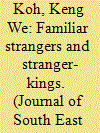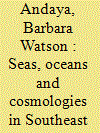|
|
|
Sort Order |
|
|
|
Items / Page
|
|
|
|
|
|
|
| Srl | Item |
| 1 |
ID:
155457


|
|
|
| 2 |
ID:
155461


|
|
|
|
|
| Summary/Abstract |
Early modern Malay historiography has been dominated by the history of European trading, colonial empires and local port-polities, often framed along indigenous-versus-foreign lines. Yet, mobility has long been a central feature of this region shaped by commerce, as evidenced by the historical phenomenon of the ‘stranger-king’. This study examines the cultural, political and economic impacts of intra-regional migration and diasporic communities in this region, specifically comparing the interconnected histories of the Chinese, Bugis, Arab, and Minangkabau communities in the seventeenth and eighteenth centuries. Locating this history within that of maritime Asia, this study provides a nuanced understanding of the historical Malay world beyond essentialism and communalism. This article highlights why scholars of the Malay world should take into account the important roles of mobility and ‘strangers’. It concludes that the Malay world was not a timeless or natural construct, but one whose contours and identity were continually shaped by significant diasporic communities and historical encounters.
|
|
|
|
|
|
|
|
|
|
|
|
|
|
|
|
| 3 |
ID:
155460


|
|
|
|
|
| Summary/Abstract |
The aim of this essay is to show through just one greatly valued trade item — in this case, the bird of paradise — how even the most distant and apparently isolated areas of the world could be linked to the major metropoles through trade. Yet this trade was anything but a simple bilateral exchange. It involved a complex series of networks that extended from the collectors to various levels of intermediaries and secondary ports, and then to foreign shippers bringing the desired product to its ultimate destination in various world markets. There is, however, another aspect of this essay which focuses not on the economic but the cultural value of trade. Most studies of the bird of paradise have commented on the cultural impact of its feathers on Western fashion, yet few have examined other cultural interpretations of the feathers that are closely associated with authority, fertility, and even invulnerability. These attitudes found in eastern Indonesia and New Guinea continue a tradition that has its roots in Southeast Asia in the early centuries of the Common Era.
|
|
|
|
|
|
|
|
|
|
|
|
|
|
|
|
| 4 |
ID:
155464


|
|
|
|
|
| Summary/Abstract |
The coexistence of Islam and matriliny has been viewed as a ‘paradox’ because of strict patriliny that Islam prescribes. This article attempts to disentangle this enigma by comparing the Minangkabau, Kerala and coastal northern Mozambique that represent the most well-known cases of simultaneous practice of Islam and matrilineal kinship, which initially was a result of peaceful Islamisation through Indian Ocean networks. In the nineteenth century, the Dutch and British colonial regimes helped matriliny to survive, despite all the efforts of the Islamists to the contrary, by codifying local juridical rules. The Portuguese integration of the local matrilineal nobility into their colonial administrative system preserved matriliny within the local Muslim order. Nowadays these communities are influenced by modernisation, nation-state policies, and Islamic reformist movements, but matrilineal principles still regulate the use of the ancestral land.
|
|
|
|
|
|
|
|
|
|
|
|
|
|
|
|
| 5 |
ID:
155459


|
|
|
|
|
| Summary/Abstract |
This article discusses the changing spirit world of maritime communities in Southeast Asia by differentiating ‘oceans’ from ‘seas’ and by linking historical evidence to modern anthropological studies. Since the lives of seagoing peoples are fraught with unpredictability, propitiation of local sea spirits was a traditional means of ensuring good fortune and protection. As long-distance voyages expanded in the early modern period, the global reach of the world religions, extending beyond familiar seas into the more extensive ocean environment, held out particular appeal. Not only were the gods, deities and saints attached to larger religious systems themselves ocean travellers; in contrast to the unpredictability of indigenous spirits, they were always amenable to requests for help, even when the suppliant was far from home waters. At the same time, as world religions were incorporated into indigenous cosmologies, maritime peoples gained greater agency in negotiating relationships with the local spirits that still wield power in Southeast Asian seas.
|
|
|
|
|
|
|
|
|
|
|
|
|
|
|
|
| 6 |
ID:
155463


|
|
|
|
|
| Summary/Abstract |
Cornelis Matelieff de Jonge (also Cornelis Cornelisz. Matelief) was a director of the Dutch East India Company (VOC) and fleet commander of a voyage to the East Indies in 1605–08. On his return to the Dutch Republic in September 1608, he wrote a series of epistolary memorials, or ‘discourses’, in which he recommended sweeping reforms in the way in which the VOC conducted business in Asia. Not only did these recommendations serve as a blueprint for subsequent developments of the VOC during the early seventeenth century, the documents also made astute observations about the dynamics of trade, geopolitics, agency of the Asian rulers as well as political power on the Malay Peninsula, Java, Maluku and Borneo. This article problematises these primary sources and demonstrates how they can be profitably mined for the history of trade and diplomacy of early seventeenth century Southeast Asia.
|
|
|
|
|
|
|
|
|
|
|
|
|
|
|
|
|
|
|
|
|